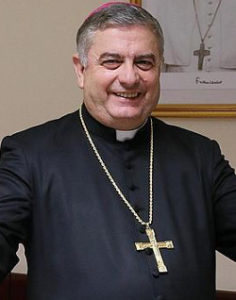 Interview with His Excellency Monsignor J.R. Carballo, Secretary of the Congregation for Religious
Interview with His Excellency Monsignor J.R. Carballo, Secretary of the Congregation for Religious
by Lorenzo Prezzi in “Settimana News”
May 9, 2021
In an interview, His Excellency Monsignor José Rodríguez Carballo, OFM, archbishop secretary of the Congregation for Institutes of Consecrated Life and Societies of Apostolic Life, speaks about the experience of religious vows in times of pandemic.
Msgr. Carballo, how is it possible to combine COVID and vow of poverty? There are many institutions that the pandemic makes economically unsustainable (schools, monasteries, parishes). How to recover the meaning of the vow of poverty? What is the Spirit’s call to serve the poor?
Indeed, COVID has put a strain on the finances and maintenance of many religious communities and their apostolic works, including many communities of contemplative life. In many cases it has been necessary to draw from the funds that the Institute or the Province had accumulated over the years through much effort and sacrifice. In other cases, it was necessary to close down works that had been run for years by consecrated persons. Many structures were sold at unfair prices. In this sense, for many religious and consecrated persons, the pandemic is an experience of dispossession and poverty, an experience often painful.
But, in addition to this experience of material poverty, in this time of pandemic we have also experienced poverty in forms imagined never before: social distancing, the use of masks that erase our smiles and much of our verbal communication, isolation, fear of being infected and of infecting…
All these are faces of poverty that we had to live through in this time of pandemic and that we probably never imagined at the time we took the vow of poverty.
From our “not having”, “from our not being able”, we have discovered new ways of living poverty in favour of the poorest. We have felt the need to make ourselves neighbours of the poor and the needy, to give our time to those who live alone and marginalized.
We have also understood that our institutions must be at the service of the mission in favour of others, and that our presence and our works must be a sign of service, gratuitousness and humility. And many religious and consecrated persons have not hesitated to make their institutions available for the service of the poorest.
On the other hand, this situation of poverty caused by Covid-19 is teaching us that we cannot turn our backs on the real poverty suffered by many of our brothers and sisters who are deprived of the necessities of life. We cannot turn a blind eye to these poverties, as the Levite and the priest did in the parable of the Good Samaritan (cf. Lk 10:31, 32). We cannot live indifferent to these brothers and sisters of ours who are in need.
And we have learned, God willing, that the cry of the poor left by the pandemic must be reflected in our budgets and our economy. We have learned that we can no longer live the vow of poverty, if the cry of the poor and the needy does not “touch” our pockets. And we also learn that we can no longer adhere to the logic of consumerism, but to the logic of solidarity and justice. And then we will have learned that the vow of poverty is not just not having, but is “living without anything of our own”, because nothing we have is ours, nothing belongs to us, but everything belongs to everyone.
Poverty and Social Unrest
The situation of poverty that emerges forcefully from the pandemic and that affects many of our contemporaries should make us discern and lead us to ask ourselves: in what way should I bring my grain of sand to the construction of a more just, more humane, more fraternal world? With whom do we habitually relate? Whom do we invite to our table?
What environments do we like and desire? How do we plan our free time, rest, vacations? Who are the privileged recipients of the mission we carry out? What concrete place do the poor have in my daily life, in the budgets of our communities?
In this context of pandemic and in the face of the forced poverty experienced by so many men and women of our time, there is a question that the Lord asks all of us: What have you done with your brother? Where is he? (cf. Gen 4:9-10). We cannot answer what Cain answered, “I do not know; am I my brother’s keeper?” (Gen 4:9). Not seeing is an option, as it was for the Levite and the priest. A sad choice. To see and not to act is a greater responsibility for which we will have to give account (cf. Mt 25:3-46).
It is no longer enough to give implicit or generic answers to so many questions that challenge the concrete way we live our vow of poverty. Let us not forget that if the vow of poverty requires much explanation or justification about where and how we live, something striking is happening that contradicts what we have professed, and shows that we are not living it radically.
On the other hand, today we can no longer only think of the poor, but we must think with the poor and as the poor. The vow of poverty asks us to leave our comforts, our community and individual greenhouses that are well protected, even economically, to expose ourselves to uncertainty, precariousness, and real need, like the poor.
The vow of poverty is a path of exodus: it asks us to move from a closed “I” or “we” to a “we” open to all, especially to those in need, knowing that the key to an evangelical economy, which should be the economy of religious and consecrated persons, is sharing (cf. Jn 6:1-13), that its distinctive feature is alternativeness (cf. Mk 9:42-48); its dynamism is critical clarity in the face of situations of injustice and poverty (cf. Lk 16:19-31); its objective is to strive to put an end to the misfortunes of the poor (Mt 5:3ff). And all this is mixed with generosity (cf. Mt 19:30-20, 16ff).
Faced with the sad reality of forced poverty that so many of our contemporaries suffer, there are some desires that cannot be lacking in religious and consecrated life: that we are not indifferent to the pain of those who suffer such poverty; that we be moved by the tears of the poor; that we do not “stifle” the desire to live differently and that we believe that this is possible; that we dream of another direction, without giving up our dreams of a different world marked by justice (cf. Lk 12:49): we can all live with less and in another way.
At the same time, the situation of forced poverty of so many of our brothers and sisters asks us, who have freely taken the vow of poverty to move towards the alternative, to courageously fight poverty, to defend the right to happiness of the weakest, to be artisans of relationships based on fraternity and social friendship (cf. Fratelli Tutti, 1), to live God’s silence not as an absence but as an involved presence, and to believe in the Spirit, that is, to nourish the certainty that, in the depths of human history, God’s active love is at work and to involve us in his work of profound historical liberation.
For religious and consecrated persons, to live the vow of poverty today means to remain free from every desire of possession and accumulation, to live sine proprio; it means to live solidarity and communion just as the primitive community of Jerusalem lived (cf. Acts 2:44-45), as the apostles lived it when they met the paralytic at the “Beautiful” Gate of the temple: “I have neither silver nor gold, but what I have I give you” (Acts 3:6).
Yes, the vow of poverty leads us to joyfully share our great treasure, Jesus, whom our contemporaries need; to give the Gospel in those peripheries where its light is lacking; to give our time, to share the little we may have, like the widow of Zarephath (1 Kings 17:10-16) or the widow in the Gospel (Mark 12:41-44).
While the desire for possession, greed in all its forms, is the cause of division and conflict, the evangelical poverty that we consecrated persons have professed must teach us to say in truth Our Father and to be what we truly are: sons and brothers, thus creating a fraternity in which the primacy of the person of the brother or sister is affirmed above all other goods or possessions; to not seek power or dominion; to share what we are and what we have and to trust in Providence; to live gratuitousness as a platform for a less defensive fraternal encounter.
Gospel poverty, freely accepted, leads us to be builders of a more fraternal society, as Pope Francis reminds us in Fratelli Tutti.
Starting from these presuppositions/principles we will be able to make ourselves neighbours, to discover the poor, the needy, whom we must go to seek, with whom we must share, who must have a place at our table. From this point of view, the pandemic can be a “grace” in misfortune.
Being for others
Covid and the vow of chastity. Loneliness and distancing have invaded all families, other than our communities. A shared loneliness? A distancing that can be rich in relationships and affection? A credible prophecy of the Kingdom?
Let’s start with a conviction: human being was certainly created as “a being before the other” or even “a being for the other” (Emmanuel Lévinas). We are beings made to enter into relationship, persons who become such in the family, created in the image of God, of the God Trinity. We are a “social being”, made “for relationship”.
Yet experience shows us that only those who know how to live solitude can fully experience relationships, to the point that we can say that solitude is a constitutive anthropological element of human beings. Moreover, relationship, in order to be such and not fall into absorption or fusion, implies solitude. Only those who are not afraid to enter and penetrate the depths of their own interiority know how to face the encounter with otherness in a positive way.
It is true that not all solitude is positive. There are forms of escape from others that are pathological and there is a solitude that is highly negative: isolation, which implies closure to others, rejection of the desire for others, fear of otherness.
In principle, the religious and consecrated person should be one who has the courage to take on solitude to look at himself, to accept being himself. Solitude is a space for unification of one’s heart and for communion with others. So, solitude is essential to relationships; it allows the truth of relationships, and is understood in relationships.
Capacity for solitude and capacity to love are proportional. Perhaps solitude, when lived fully, is one of the greatest signs of love. From there – and only from there – can we understand the solitude chosen by a person who takes the vow of chastity or a promise of celibacy. For these people, solitude is a “place” of communion with the Lord, with themselves, and with others.
Certainly, because of the pandemic, solitude and social distancing have invaded family environments, including those of our communities, although in the latter they have been somewhat mitigated by fraternal life in community, which in many cases has been strengthened by the pandemic, and by the greater space that consecrated persons generally have in their homes.
However, consecrated persons have also felt a certain “negative solitude” due to the impossibility of meeting, personally and not only virtually, with the brothers and sisters of other communities, with prayer groups, with groups of young people or lay people aggregated to the Institute and who visit our houses, and also due to the impossibility of meeting as councils or chapters….
In this context, social distancing has weighed on us. We are not accustomed to it; it is difficult to bear the imposed loneliness and distancing that fall upon us without warning, as those of us who have been forced by the pandemic. In this situation, loneliness can fill our lives with sadness, can hurt us deeply. And from this pandemic many, even consecrated people, will emerge wounded. It is from this solitude that we must flee.
But it is also true that there is a solitude and a distancing, which Jesus sought for his own (cf. Mk 6:31), that reveal, that help us to a deeper encounter with ourselves and with others. Just as the most authentic word is born out of silence, so the deepest encounter is born out of solitude lived with love, “the sounding solitude” (St. John of the Cross), the accompanied solitude, the solitude that we consecrated persons assume with the vow of chastity.
When the love of Jesus begins to occupy our hearts, nothing more, neither imposed solitude nor compulsory social distancing, as is the case in these COVID times, can separate us from others.
Vow of Chastity
The vow of chastity, which entails assuming a certain form of solitude and distancing, must be lived, especially in these times of pandemic, as an opportunity to establish new bonds of profound encounter with the brothers and sisters of one’s own community and with all humanity, particularly wounded humanity.
Let us make solitude and imposed distancing bridges of communion, bridges of encounter. Let us establish healthy relationships of fraternity, friendship and solidarity; let us live the gift of love to the full, holding nothing back. From the consolation received from “You are my Lord”, let us feel strengthened to console, as a priority form of mission.
Our world needs people who are willing not to close their eyes to the continuous devastation, abuse and violence with which the dignity of people is wounded on a daily basis. Are we aware of the potential for love that our chaste and celibate lives contain? The charism of celibacy and the vow of chastity are a matter of love, and must lead us to bring them to fruition in unconditional love, even in the midst of imposed loneliness that we are experiencing.
In these times of pandemic, we must rethink the way of chaste and celibate love by looking to Jesus, so that we are free to love and become the family of all because of the common dignity that binds us. This does not become a reality once and for all. It takes time. It is a charism, and it activates our responsibility.
With the vow of chastity, consecrated men and women propose to love “with him and like him,” to love as Jesus loved, without measure, without forgetting that the solitude Jesus experienced on the cross is a mystery of solitude and communion at the same time.
It is a mystery of love. This is how we must live this moment in which we experience solitude and distancing. The vow of chastity we have professed leads us to accept distance and to respect otherness. To love with a chaste heart is a difficult task, but it is possible.
Consecrated persons and civil society
COVID and obedience. Communities have obeyed health regulations, even in the celebrations at home. What does this civil obedience mean and what is its limit? In your opinion, how has the exercise of governance changed because of the pandemic? What about the collective structures of government (councils, chapters, assemblies)?
We consecrated persons cannot forget that we are part of the society and, as such, we are obliged to obey our authorities and, particularly, in these times of pandemic, the health regulations. Religious and consecrated persons are not exempt from this obedience. We must consider ourselves witnesses of an “active citizenship.” Respect for the rules of civil coexistence is a contribution to the common good, a commitment that religious and consecrated persons cannot neglect. It is a fundamental value in the Church’s social doctrine.
We religious and consecrated persons have a responsibility, even in the field of healthcare, towards ourselves and towards others. It is necessary to harmoniously combine individual rights with the common good, including freedom of worship. In this context, a distinction must be made between prohibition and limitation of the rights of individuals and the community. There are limits that are necessary, if we want to guarantee the health and safety of people.
Another thing is, when it comes to prohibiting fundamental rights or when it comes to laws that go against the Gospel, the “absolute rule” for consecrated persons (Pope Francis). Here one cannot compromise. In these cases, the principle that “one must obey God rather than men” (Acts 5:29) applies. Consecrated life has a prophetic mission in the Church. Consecrated persons, as prophets, are men and women of the Word, so they cannot fail to obey it and pass it on. As prophets, consecrated men and women know very well what it means to “give to Caesar what is Caesar’s and to God what is God’s” (Mt 22:21).
In any case, I would not speak of “limits” with regard to civil obedience, but of “responsible responses.” We consecrated persons participate fully in the destiny of the people, to whom we are indebted; we are brothers among brothers, “fellow travellers sharing the same flesh” and “children of the same earth which is our common home” (Fratelli Tutti, 8).
As for the second part of the question, I think the exercise of governance has not changed. The pandemic has placed restrictions on this exercise that are plain for all to see. I have serious doubts if it is possible to continue over time and that the “virtual governance” of an Institute is truly effective.
There is no doubt that the telematic culture is globalizing consecrated life, but I am sure that good “governance” is woven of relationships, agreements, confrontations and much dialogue, especially in difficulties.
I have the impression – and I am not alone – that the mentality and practice that “virtual presence” is synonymous with “fraternal presence” or “physical presence” is growing in our circles. If this is the case, I think the ambiguity could empty the meaning of the government of an Institute. I am of the opinion that a “virtual presence” is simply virtual and nothing more, and that it can never replace personal presence.



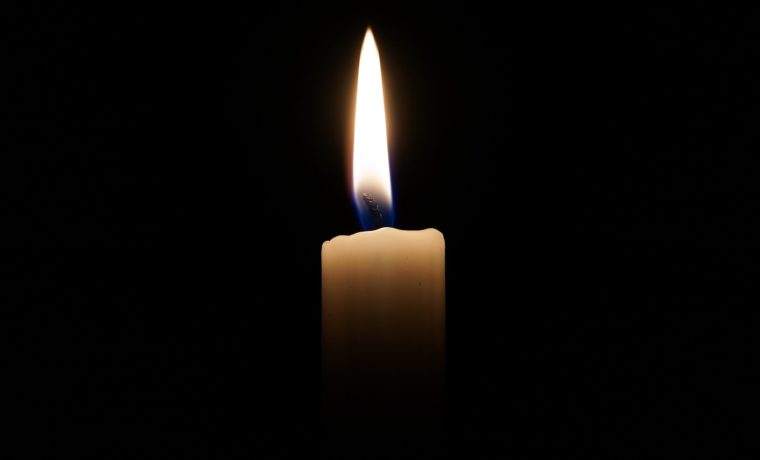
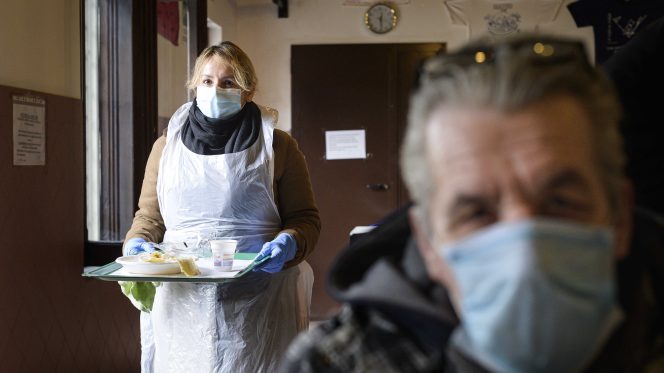

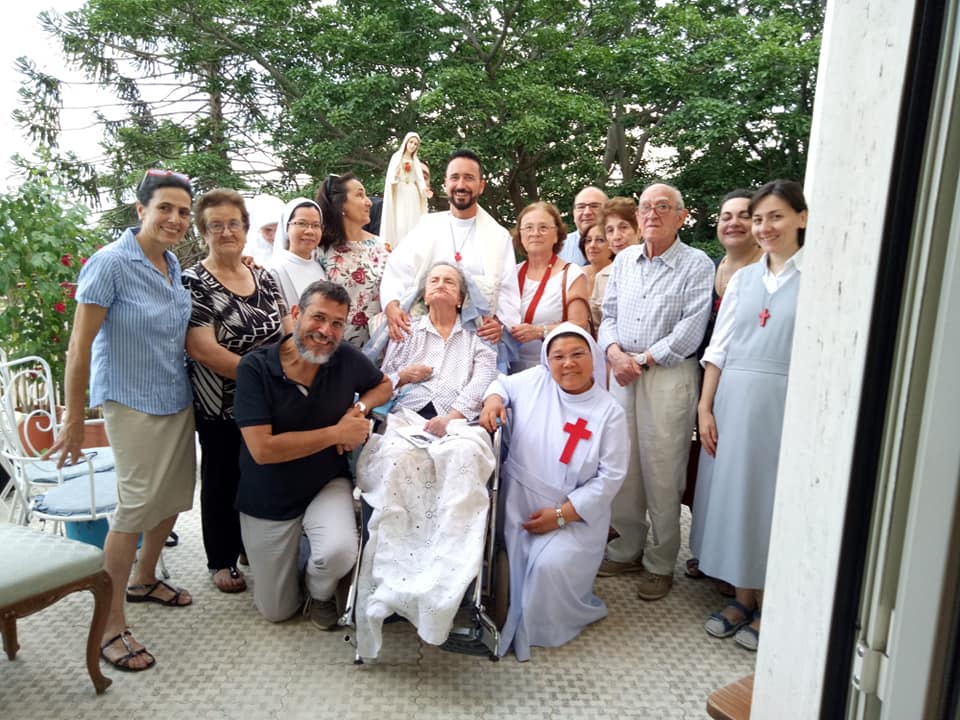
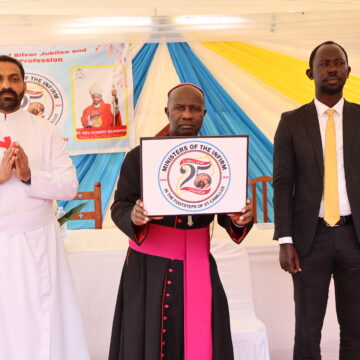
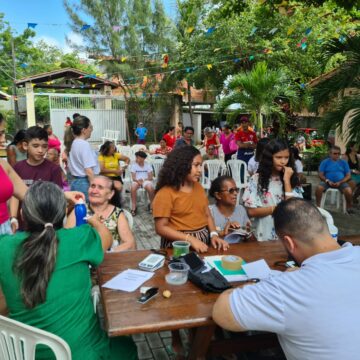
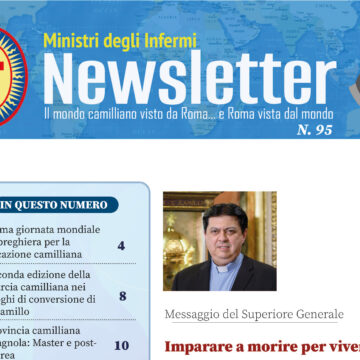
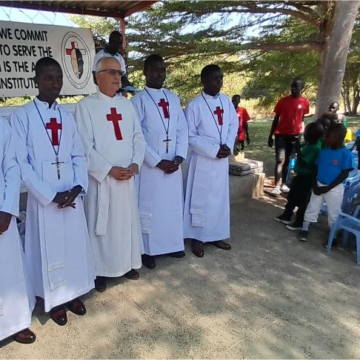
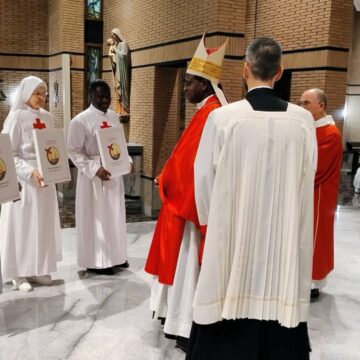

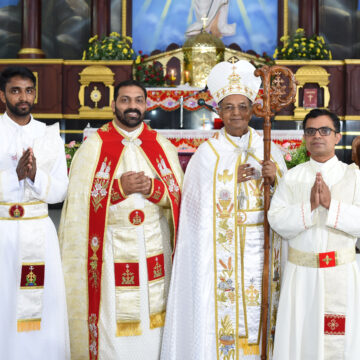
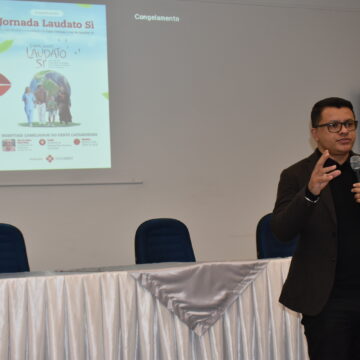
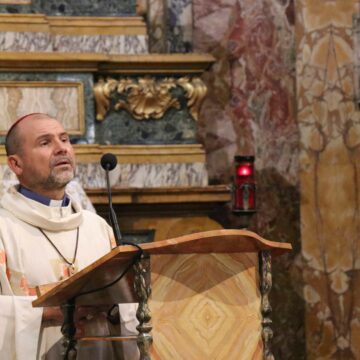
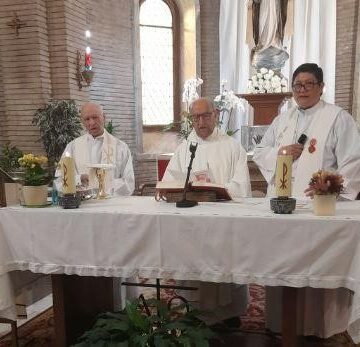
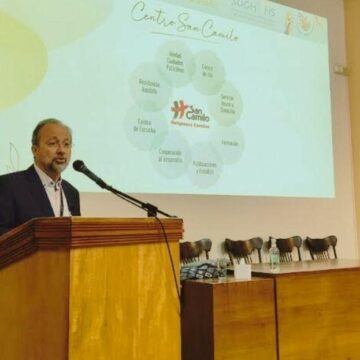
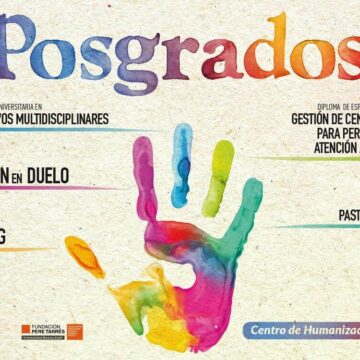
Camillians on Facebook
Camillians on Twitter
Camillians on Instagram